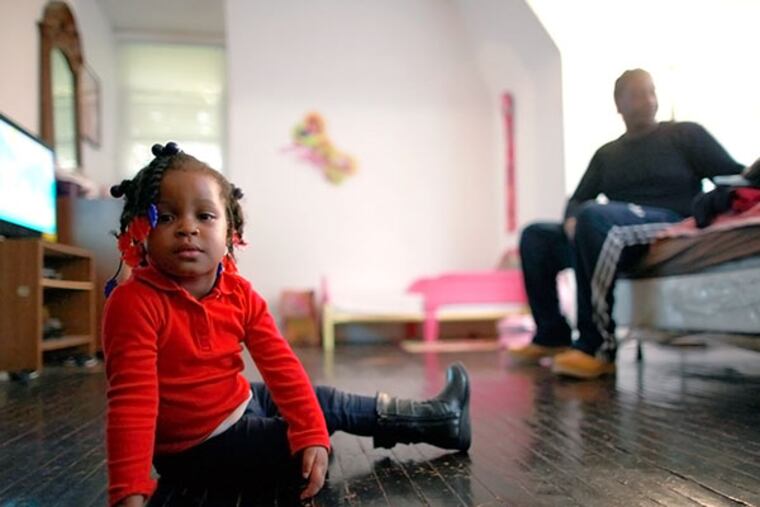Disability of 2-year-old raises questions on federal aid programs
In her coat, Maziah Mills-Sorrells looks like any other 2-year-old, an animated sprite, all bounce and spirit. But when Maziah's mother, Essie Mills, took the child's coat off in front of their apartment the other day, Maziah's left arm dropped lifelessly, her hand scraping the cement porch.

In her coat, Maziah Mills-Sorrells looks like any other 2-year-old, an animated sprite, all bounce and spirit.
But when Maziah's mother, Essie Mills, took the child's coat off in front of their apartment the other day, Maziah's left arm dropped lifelessly, her hand scraping the cement porch.
Maziah didn't feel it, just as she felt nothing last year when she fell and broke that same arm.
Afflicted with a rare condition known as Klumpke's palsy, Maziah has had a paralyzed arm since she was injured during childbirth. Doctors say it's permanent.
Maziah and her parents live in poverty in West Philadelphia. They have tried and failed to get child-disability benefits from the Social Security Administration. Officials won't comment on why.
They receive Medicaid, which pays for many of Maziah's medical bills, including a surgery that couldn't help her. But children with disabilities cost their families $6,000 to $20,000 a year in out-of-pocket expenses beyond medical costs, experts say.
Soon the family will be be going to federal court in Philadelphia in yet another attempt to obtain benefits they say they need to live life with a seriously disabled child.
"I won't give up," said Mills, 24, who works 50 hours a week at two health-care jobs and lives with Maziah's father, Raashid Sorrells, also 24, who was just laid off from a fast-food job. Family income is now at $17,000, well below the poverty level.
The Mills-Sorrellses have been attempting to negotiate an opaque and little-understood federal bureaucracy created to help low-income parents pay for the costs of raising a child with severe disability.
The Supplemental Security Income (SSI) childhood disability program, part of the Social Security system and created during the Nixon administration, gives around $10 billion a year in benefits to low-income families with children under age 18. Maximum monthly checks are $710.
To receive SSI benefits, a family with two parents can't have more than $3,000 in assets, and can't make more than double the poverty level, experts say. (The poverty level for a family of three is $19,530.)
Around two-thirds of benefits go to children with mental conditions, federal data show. The program denies benefits to six out of 10 children.
"SSI rules are byzantine and too strict," said Susan Parish, a professor of disability policy at Brandeis University in Massachusetts. "Deserving families aren't getting benefits."
A Social Security spokesman, B.J. Jarrett, said the agency adheres to definitions and rules set up by Congress to determine whether a person is disabled. He added the program is "one of the most accurate" in the government.
In 2012, 1.3 million low-income children received SSI, fewer than 25 percent of all children with disabilities, said Rebecca Vallas, deputy director of government affairs for the National Organization of Social Security Claimants' Representatives, a nonprofit that represents attorneys.
Overall, 14 percent of low-income families with disabilities receive SSI, said Jonathan Stein, the Community Legal Services attorney representing Maziah.
Ironically, SSI has a reputation among conservatives and some media as a better-than-welfare money machine easy to game.
Not true, SSI experts say.
"There's more myth than fact about disability programs," Vallas said. Anecdotal news reports of children faking disabilities to fool examination doctors are laughable, she added.
It isn't clear why Maziah was turned down three separate times by SSI, since officials both in Harrisburg and Social Security headquarters in Baltimore will not comment on her case.
She is suffering from nerve damage that occurred when she was stuck in her mother's birth canal and was pulled out forcibly, said Mills, who, in a separate case, is suing the hospital where Maziah was born for the injury.
Stein quoted a Social Security Administration judge as conceding that Maziah "has no strength and very limited motion" in her left arm, and is "unable to participate in bilateral playful activity due to non-functional left hand." Further, the judge is quoted as saying, Maziah "has balance issues that affect her ability to move about independent of support." But the same judge found that her condition was not severe enough to warrant payment of benefits.
Stein said he can't understand why those impairments don't qualify the child for benefits. He added that he wants the case to "reveal the failings in the system of saying paralysis of the arm is serious, but not very serious."
Maziah can't climb stairs alone, change her clothes, put on shoes, or be potty-trained because of the damage, her mother said. She's beginning to throw tantrums out of frustration, Mills added.
Research shows that families caring for children with disabilities are more than twice as likely as other families to face homelessness, lack of food, and utility shutoffs.
"We don't have many clothes for her," Mills said, standing in the family's bedroom where parents and child sleep. "She has no sneakers, I won't be able to give her Christmas presents, and I'm $1,300 behind on the rent. I can't take her to her therapy when I want because I'm working every day and every weekend.
"I just don't know what we'll do."
215-854-4969